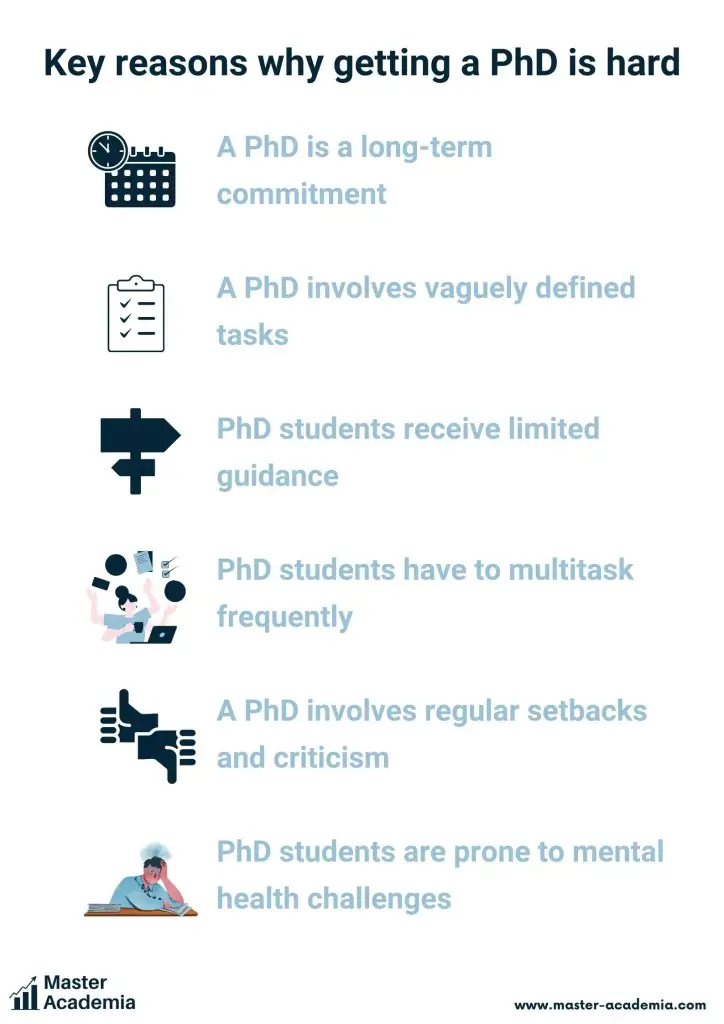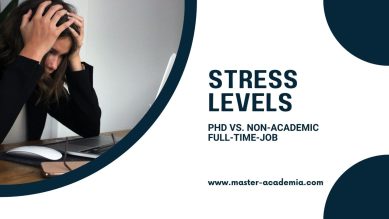
Getting a PhD is a long-term commitment that requires a high degree of self-responsibility, commitment, and perseverance, which makes it a difficult task. PhD students have to deal with vaguely defined tasks, limited guidance, and multitasking frequently. Moreover, they are prone to mental health challenges and setbacks and criticism. Despite these challenges, a PhD can be worth it. Learn more!
Contents
Why getting a PhD is not an easy task
The decision to pursue a PhD is a life-altering one. Those who consider embarking on this journey have to take a lot of factors into account. If you are one of them, you should for instance reflect on why you want to do a PhD, whether to do it full-time or part-time, or how to finance it.
Additionally, there is often an underlying concern about the difficulty of getting a PhD. You may ask yourself: “Am I ‘good’ enough to master this task?” or “How difficult is it really?”
Getting a PhD is undoubtedly hard because it requires a high degree of self-responsibility, commitment and perseverance over the course of several years.
This does not mean that a PhD is not right for you. Rather, it is important to fully understand the practical implications of the high degree of self-responsibility, commitment and perseverance. Based on this understanding, you can make an informed decision.
Key reasons why getting a PhD is hard
A PhD is a long-term commitment
Pursuing a PhD is not a decision to be taken lightly, as it is not something you can complete quickly.
Therefore, you should be extremely critical of people stating that you can write a PhD thesis in 3-6 months. It’s near impossible.
In Europe, for instance, a master’s degree is a common prerequisite to start a PhD trajectory. Data on the length of PhD studies in Europe show that after a master’s degree, obtaining a PhD takes on average 3.5 – 4.5 years.
And this is just the average. It’s not uncommon for a PhD to take 5 years or longer!
Thus, if you struggle to commit to longer and more complex projects, a PhD may be challenging for you to complete.
A PhD involves vaguely defined tasks
The high degree of self-responsibility inherent in PhD studies often means that clear or predefined tasks are lacking.
This lack of clear guidance typically starts at the PhD proposal stage, where students are often required to devise their research topic or approach on their own.
And PhD students cannot simply do what they want to, but must instead identify a gap in existing literature, advance science, and are often required to make a societal contribution through their research.
Easy-peasy? Not at all.
Academic work frequently lacks a clear endpoint and can become all-consuming.
In fact, the absence of clearly-defined tasks and expectations tends to lead to insecurities and the widespread feeling of PhD students of not knowing when something is good enough or when to stop.
PhD students receive limited guidance
The regularity of supervision meetings and supervisors’ involvement in a PhD student’s research can vary widely. However, overall, a PhD consists mostly of independent work.
PhD supervisors are there to guide PhD students. Yet, ultimately, PhD students are largely responsible for their projects and progress.
There are strategies to get the most out of supervision meetings. Nonetheless, a PhD journey is often described as ‘the art of muddling through’. This means that despite a lack of expertise, PhD students must persevere and figure things out.

PhD students have to multitask frequently
Pursuing a PhD involves much more than just conducting research. The academic job market is competitive, and the expectations of what PhD students ought to achieve during their PhD studies are high.
This idea that PhD students spend all their time in the library or in a laboratory, uninterrupted and buried in books or immersed in experiments, is far from accurate.
On the one hand, PhD students are expected to develop all-round academic profiles which include research, teaching, conference presentations, funding acquisition and demonstration of leadership.
On the other hand, many PhD students struggle financially as they do not receive sufficient funding. They have to work extra jobs, and often worry about the future.
Depending on the university system and context, additional extensive course work can be part of a PhD trajectory. PhD students who can easily feel overwhelmed and struggle with the constant need to multitask.
A PhD involves regular setbacks and criticism
Not only is the academic system competitive, but it can also be harsh. Criticism is often provided very directly.
Therefore, many PhD students struggle with feelings of failure when things don’t work out as planned, such as failed experiments or rejected journal articles or conference applications.
In addition, PhD students often take this criticism personally because they invest so much time and effort into their work, only to have it critiqued by supervisors, peer reviewers or others.
However, criticism and rejection are common in academia and can be viewed as opportunities for improvement.
It takes time and effort to gain the confidence to handle negative feedback, which can otherwise be demoralizing for PhD students.
PhD students are prone to mental health challenges
Considering the challenges faced by PhD students, it becomes clear that they need to develop a strong emotional resilience to navigate through the academic system.
Many PhD students struggle with imposter syndrome, doubting their own abilities. And unfortunately, mental health issues are very prevalent among PhD students.
The academic system can both create and exacerbate existing mental health struggles, which in turn makes it even harder for many PhD students to obtain their degree.
Even though getting a PhD is hard, it can be worth it
It is important to distinguish between being aware of the challenges of obtaining a PhD and rejecting the challenge altogether. Even though there are several key reasons that make obtaining a PhD a challenging endeavor, it can still be the right choice for you.
Yes, stress levels during a PhD can often be experienced as higher than those during a full-time job. However, this obviously varies depending on the individual’s personality and job circumstances.
Furthermore, many people also have positive experiences doing their PhD, and view their studies as a valuable and enjoyable time for personal and professional growth.
Therefore, do not let fear hold you back from pursuing a PhD.
And you can actively take steps to avoid common pitfalls during a PhD journey. This can include selecting a supportive academic environment, finding a sense of community, choosing a position with reasonable expectations and funding, and seeking mental health support early on.



